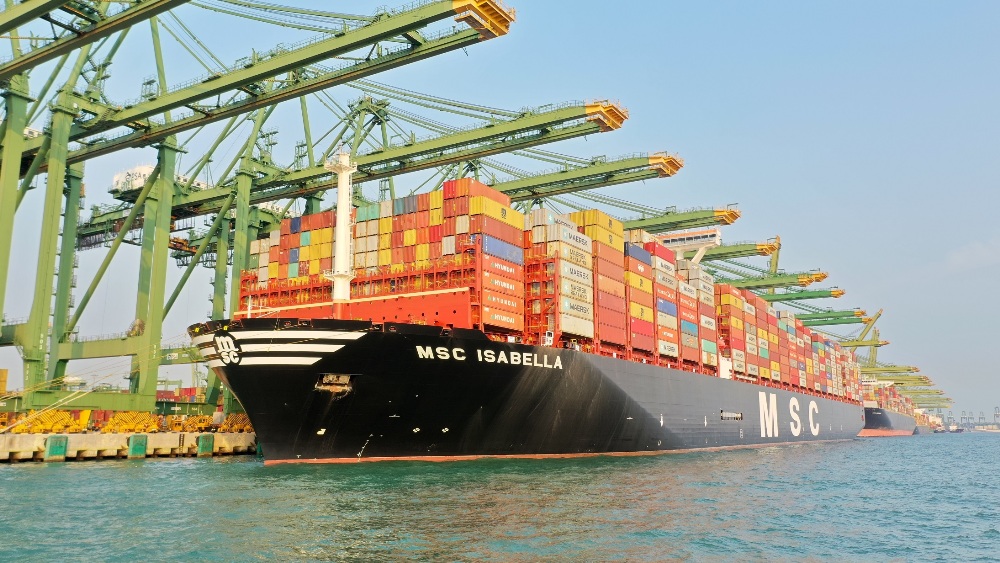MSC ISABELLA, one of the new ships from MSC’s GÜLSÜN class of container vessels, made its maiden call at the Port of Singapore on 10 November 2019. The GÜLSÜN class is currently the world’s largest series of container ships

MSC ISABELLA is the biggest container ship to date to call at Singapore, the world’s top transhipment hub. Measuring around 400m long and 61m wide, the ship can carry up to 24 rows of containers, with a height of 13 tiers on deck. Its total capacity is 23,656 TEU.
Singapore is the ship’s first port-of-call in Asia after sailing back from Europe. The ship was delivered to MSC in August 2019. It started sailing from Qingdao port on 28 August and has now completed its first round-trip between Asia and Europe.
The picture above illustrates the lashing bridges between each row and the absence of lateral stack dividers in the GÜLSÜN class
“Our biggest and most energy efficient ships are being deployed on the Asia-Europe trade, which demonstrates our continued commitment to this largest and busiest trade corridor. We are delighted to welcome the first port call in Singapore by MSC ISABELLA,” said Mr Y J Tan, Regional Managing Director for MSC Asia Regional Office in Singapore.
Aside from its capacity, the vessel is equipped to carry more than 2,000 refrigerated containers, boosting the trade of goods such as food & beverage, pharmaceutical products, perishables and other chilled or frozen items between Asia and Europe.
Mr Eddy Ng, Managing Director for PSA Singapore Terminals 2, said: “We are heartened by the arrival of MSC ISABELLA at MSC-PSA Asia Terminal in Singapore. It affirms the strong commitment and steadfast partnership between PSA and MSC, while also demonstrating PSA’s capability to efficiently handle the world’s largest container vessels, further enhancing the status of the Port of Singapore as a premier global transhipment and logistics hub.”
MSC ISABELLA is already fitted with the technical solution to comply with this new regulation, an IMO-approved hybrid exhaust gas cleaning System, and it has the option of switching to low-sulphur fuel, or to be adapted for LNG use in the future.
Other fuel-saving features include:
- Shore power connection to enable "cold ironing" in port
- Innovative engineering features, such as optimised rudder-bulb and bulbous bow,
minimised ship side wind resistance, and an exhaust gas economiser for auxiliary engines
According to MSC, the GÜLSÜN class emits just 7.72 grams of CO2 to move 1 ton of cargo 1 nautical mile. Service speed is 23 knots. However, claims like this, which are commonly made by shipping lines, need to be treated with caution, without knowing the basis for calculation. TEU intake depends on an average container weight assumption, and the ships need to be carrying full loads in each direction.
Built at the Daewoo Shipbuilding & Marine Engineering (DSME) shipyard in South Korea, MSC ISABELLA is among the 11 ships of over 23,000 TEU to be delivered to MSC from 2019 to 2020. Deployed on MSC’s Swan service, the vessel will next call at the Port of Hong Kong after leaving Singapore.
Source: WorldCargoNews